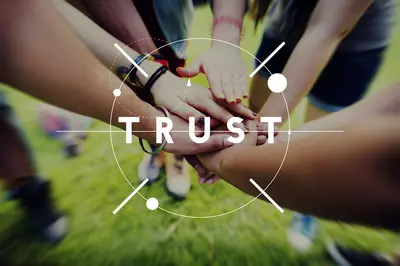
Imagine you have a friend who always shows up fifteen minutes late, who looks at his phone when you are speaking and loves to start a conversation with, "Don't tell so-and-so I told you this, but…"
Even if you've known this person your whole life, you notice a sense of uneasiness when they are around. Perhaps your shoulders tense up when they call, or you feel nervous when telling them about your day because you know they are probably going to gossip about it with someone else. There is no trust in this relationship, so you don't feel secure – and as a result, you don't enjoy the benefits that a good friendship can offer, including a feeling of deep connection and belonging.
 Be a trustworthy friend
Be a trustworthy friend
In her book Dare to Lead, researcher and author Brene Brown names seven elements needed to establish trust, using the acronym BRAVING:
- Boundaries
- Reliability
- Accountability
- Vault (keeping confidences)
- Integrity
- Nonjudgment
- Generosity
By prioritizing trust in our personal relationships, we can help both ourselves and others feel emotionally safe.
Practice nonviolent communication
Communicating effectively and compassionately is central to building trust. One model for connecting in deeper conversation is Nonviolent Communication (NVC), which comprises four parts:
- Observe what is around you.
- Notice how you feel about what is happening.
- Identify your needs.
- Ask for what you need.
In turn, you listen when others express how they are feeling and ask for what they need. It does not mean that you will always be able to honor the request, or have your requests met, but you will each be reflecting honestly and listening to each other, and that alone builds connection and trust.
Over time, you will begin to have a sharper sense of the connection between what is happening and how you feel, and you will become more empathetic to the needs that everyone has in any given circumstance. This vulnerability and deep listening can help others feel secure as they share their own feelings and needs.
Build trust at work
Researchers know that trust in the workplace can lead to happier employees who work more effectively and stay with the job longer. According to Dr. Amy Edmondson of Harvard University, psychological safety also exists in the workplace when everyone experiences mutual respect and feels comfortable being themselves.
As employees and employers, we can help to promote a greater sense of psychological safety, for ourselves and others by:
- Acknowledging our own fragility and biases.
- Recognizing and honoring everyone's unique life experiences.
- Committing to listening to learn.
- Replacing blame with curiosity.
- Providing opportunities for open dialogue and respectful sharing of differing perspectives.
- Encouraging experimenting with new ideas and processes, without fear of repercussions.
- Considering mistakes as lessons learned and as opportunities to learn and grow.
- Practicing authentic acts of compassion, gratitude, appreciation, and recognition.
Benedictine University. (2018). Creating Psychological Safety at Work in a Knowledge Economy | Amy Edmondson, Harvard [Video]. YouTube. https://www.youtube.com/watch?v=KUo1QwVcCv0
Brown, B. (2020). Braving: The Seven Elements of Trust. Retrieved from https://daretolead.brenebrown.com/wp-content/uploads/2018/10/BRAVING.pdf
Center for Spirituality and Healing (n.d.) Wellbeing 101: Tips and Strategies to Help You Focus on Wellbeing. https://www.csh.umn.edu/sites/csh.umn.edu/files/umncsh_wellbeing_guide_…;
What is Nonviolent Communication? | Center for Nonviolent Communication. (2020). Retrieved 18 December 2020, from https://www.cnvc.org/learn-nvc/what-is-nvc
Zak, P. (2017). The Neuroscience Of Trust. Harvard Business Review. https://hbr.org/2017/01/the-neuroscience-of-trust


